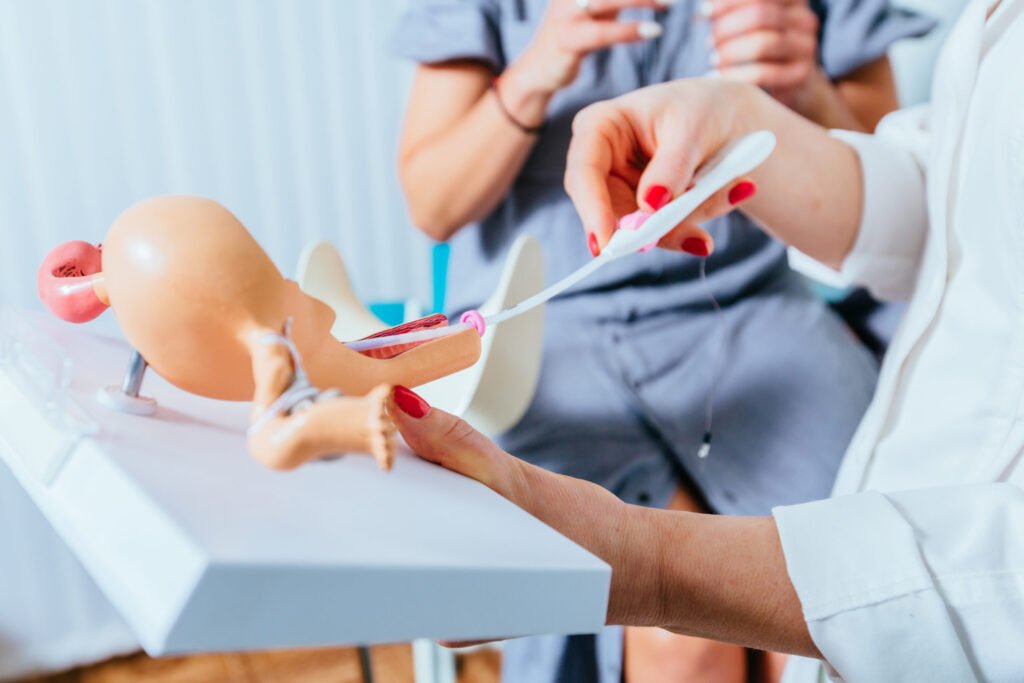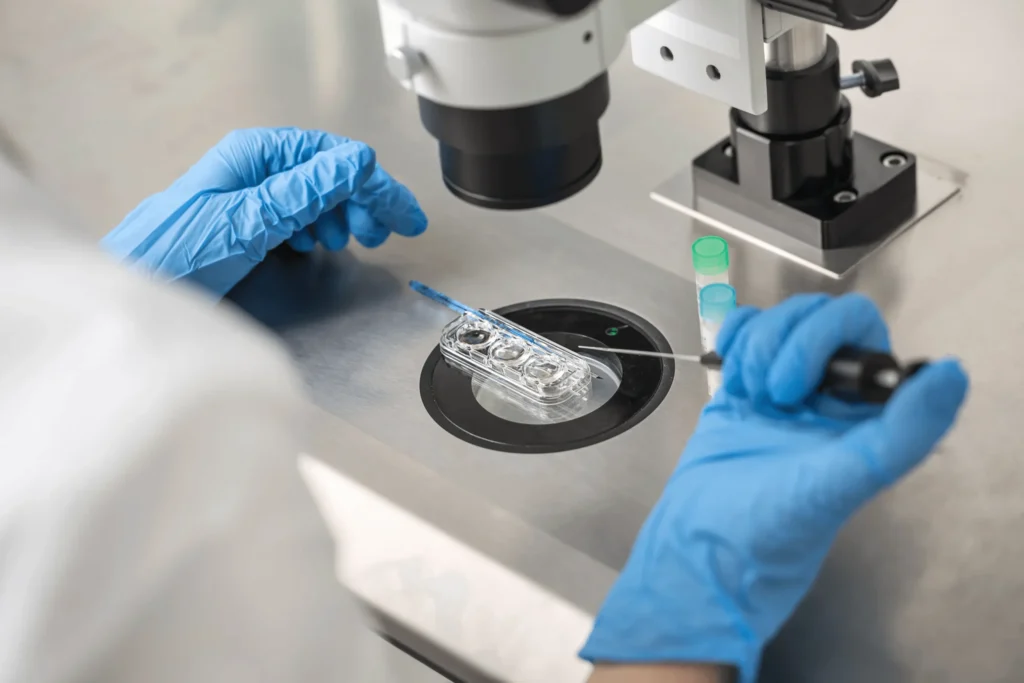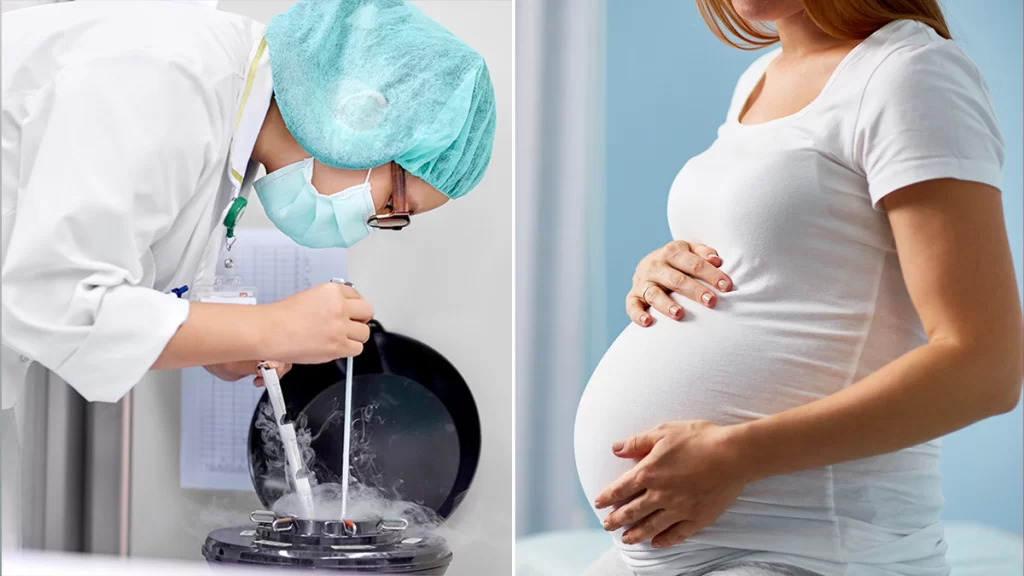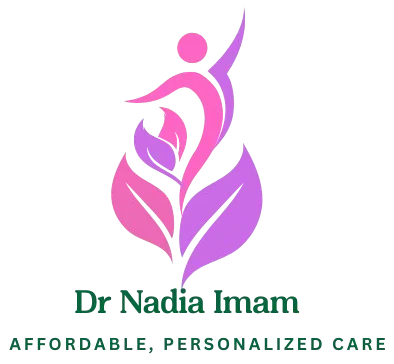Our Treatments
Fertility enhancing surgeries
Fertility enhancing surgeries are specialized procedures designed to improve a woman’s chances of conceiving naturally. These surgeries address structural or anatomical issues within the reproductive system that may hinder fertility, such as uterine fibroids, polyps, endometriosis, tubal blockages, or adhesions. Performed using advanced minimally invasive techniques like laparoscopy or hysteroscopy, these procedures ensure quicker recovery and minimal discomfort. By correcting these underlying issues, fertility enhancing surgeries can significantly boost the success rates of natural conception or assisted reproductive treatments. A thorough evaluation by a fertility specialist helps determine the need and type of surgery based on individual medical history and diagnosis.

Assisted Reproductive Technology (ART)- IVF, ICSI, PGT
Assisted Reproductive Technology (ART) encompasses advanced fertility treatments designed to help individuals and couples conceive. Among the most common techniques are IVF (In Vitro Fertilization), ICSI (Intracytoplasmic Sperm Injection), and PGT (Preimplantation Genetic Testing). IVF involves fertilizing eggs with sperm outside the body, while ICSI directly injects a single sperm into an egg, often used in cases of male infertility. PGT screens embryos for genetic disorders before implantation, increasing the chances of a healthy pregnancy. These technologies offer hope to those facing infertility, enabling personalized, precise, and effective solutions for achieving parenthood under expert medical guidance.

Medically Assisted Reproduction (MAR)-Ovulation Induction (OI), Intrauterine Insemination (IUI)
Medically Assisted Reproduction (MAR) includes treatments like Ovulation Induction (OI) and Intrauterine Insemination (IUI) to help couples conceive. OI stimulates the ovaries to produce eggs using hormonal medications, improving chances of ovulation. IUI involves placing specially prepared sperm directly into the uterus during ovulation, increasing the likelihood of fertilization. These methods are minimally invasive, cost-effective, and often used as first-line fertility treatments. MAR offers hope to couples facing infertility, guided by medical expertise and personalized care plans.

Intracytoplasmic Sperm Injection
Intracytoplasmic Sperm Injection (ICSI) is an advanced fertility treatment used primarily in cases of male infertility. In this procedure, a single healthy sperm is directly injected into the cytoplasm of an egg to facilitate fertilization. ICSI is often recommended when sperm count is low, motility is poor, or previous IVF attempts have failed. It significantly increases the chances of successful fertilization, especially in severe male factor infertility. The fertilized embryo is then transferred to the woman’s uterus for implantation. ICSI has revolutionized assisted reproductive technology, offering hope to couples facing complex fertility challenges. With expert guidance and precise lab techniques, ICSI has helped thousands achieve their dream of parenthood.

Pre-Implantation Genetic Diagnosis
Pre-Implantation Genetic Diagnosis (PGD) is an advanced reproductive technology used alongside IVF to screen embryos for genetic disorders before implantation. This technique is especially beneficial for couples with a known risk of passing on inherited conditions, such as thalassemia, cystic fibrosis, or chromosomal abnormalities. PGD involves testing a few cells from the embryo at an early stage, ensuring only healthy embryos are selected for transfer. It not only increases the chances of a successful pregnancy but also reduces the risk of miscarriage and genetic disease in the child. PGD offers peace of mind to prospective parents by enabling them to make informed reproductive choices and take proactive steps toward a healthier future for their family.

Social Egg Freezing
Social Egg Freezing is an advanced fertility preservation technique that allows women to freeze and store their healthy eggs for future use. It offers flexibility and peace of mind to those who wish to delay parenthood due to personal, professional, or medical reasons. The process involves stimulating the ovaries, retrieving mature eggs, and cryopreserving them using vitrification. Social egg freezing empowers women to take control of their reproductive choices without compromising the quality of their eggs due to age-related decline. It is ideal for women in their late 20s to early 30s who are not yet ready to conceive but want to preserve the option. With expert guidance and advanced technology, this method offers hope and confidence for future family planning.

Onco Fertility
Oncofertility is a specialized field that bridges oncology and reproductive medicine, focusing on preserving fertility in individuals diagnosed with cancer. Cancer treatments such as chemotherapy, radiation, and surgery can significantly impact reproductive health, often leading to infertility. Oncofertility offers hope by providing advanced fertility preservation options like egg or sperm freezing, embryo preservation, and ovarian tissue cryopreservation before treatment begins. It empowers patients to plan for a family in the future, even after completing their cancer journey. Timely counseling and collaboration between oncologists and fertility specialists are crucial to ensure the best outcomes. Oncofertility helps patients make informed choices while prioritizing both survival and quality of life.

Recurrent IVF Failure
Recurrent IVF failure can be emotionally and physically challenging for couples trying to conceive. It refers to multiple unsuccessful IVF cycles despite the transfer of good-quality embryos. Several factors may contribute, including poor embryo quality, uterine abnormalities, immunological issues, or hormonal imbalances. A thorough evaluation is essential to identify underlying causes and tailor a personalized treatment plan. Advances in reproductive medicine such as genetic testing, endometrial receptivity analysis, and lifestyle modifications can improve success rates. With expert guidance, emotional support, and persistence, many couples overcome recurrent IVF failures and move closer to achieving their dream of parenthood.

PESA / TESA / TESE
PESA (Percutaneous Epididymal Sperm Aspiration), TESA (Testicular Sperm Aspiration), and TESE (Testicular Sperm Extraction) are advanced surgical techniques used to retrieve sperm in men with obstructive or non-obstructive azoospermia (absence of sperm in semen). These procedures are especially beneficial for couples undergoing IVF or ICSI. PESA involves retrieving sperm directly from the epididymis using a fine needle, while TESA and TESE involve extracting sperm from testicular tissue. These methods are safe, minimally invasive, and offer hope to men with low or absent sperm counts. The retrieved sperm can be used immediately or frozen for future use, helping couples achieve their dream of parenthood through assisted reproductive technologies.

Prenatal Check Up & Counselling
Prenatal Check-Up & Counselling is essential for ensuring a healthy pregnancy for both mother and baby. Regular check-ups help monitor the baby’s growth, detect any complications early, and provide guidance on nutrition, lifestyle, and emotional well-being. Counselling sessions offer expectant mothers and families the opportunity to ask questions, address concerns, and prepare for labor, delivery, and parenthood. These sessions cover topics like prenatal vitamins, fetal development, screening tests, mental health support, and personalized care plans. Early and consistent prenatal care significantly improves pregnancy outcomes, reduces risks, and builds confidence in expectant parents. Trust in expert care to guide you every step of the way toward a safe and joyful delivery experience.

Adolescent health issues
Adolescent health issues encompass a range of physical, emotional, and psychological challenges that arise during the transition from childhood to adulthood. Common concerns include hormonal changes, acne, menstrual irregularities, growth-related problems, mental health issues like anxiety and depression, and risky behaviors such as substance use or poor diet choices. This period is also crucial for developing healthy habits, self-identity, and coping skills. Early intervention, open communication, and regular medical guidance can help adolescents navigate this phase confidently. Comprehensive care that addresses both physical and emotional well-being is essential for supporting teens as they grow into healthy, responsible, and resilient adults.

Post menopausal health issues
Postmenopausal health issues often arise due to the natural decline in estrogen levels, affecting both physical and emotional well-being. Common symptoms include hot flashes, night sweats, mood changes, vaginal dryness, and sleep disturbances. Over time, women may face an increased risk of osteoporosis, heart disease, weight gain, and urinary incontinence. Emotional concerns such as anxiety and depression can also become more prominent. Maintaining a healthy lifestyle, staying physically active, and undergoing regular health checkups are essential for managing these changes. Early medical intervention and personalized care can significantly improve quality of life and help women navigate this phase with confidence and comfort.

Looking for expert fertility advice?
Contact us today.
Frequently Asked Questions
Dr Nadia offers fertility treatments like IVF, IUI, ICSI, egg freezing, high-risk pregnancy care, laparoscopic surgeries, and hormonal imbalance management. She tailors each treatment based on patient needs.
If you’ve been trying to conceive for over a year (or 6 months if over age 35), or have irregular cycles, miscarriages, or known conditions like PCOS or endometriosis, it’s time to consult.
IVF is a generally safe and minimally invasive process. Some discomfort may occur during injections or egg retrieval, but these are short-lived and well-managed under professional care.
You can call +918789662806 to schedule your visit. Walk-ins are also welcome during clinic hours, but prior booking ensures quicker consultation.
She is available at Udayan Hospital (9:00–10:30 AM) and PHS Fertility Centre (11:00 AM–4:00 PM), Monday to Saturday.

